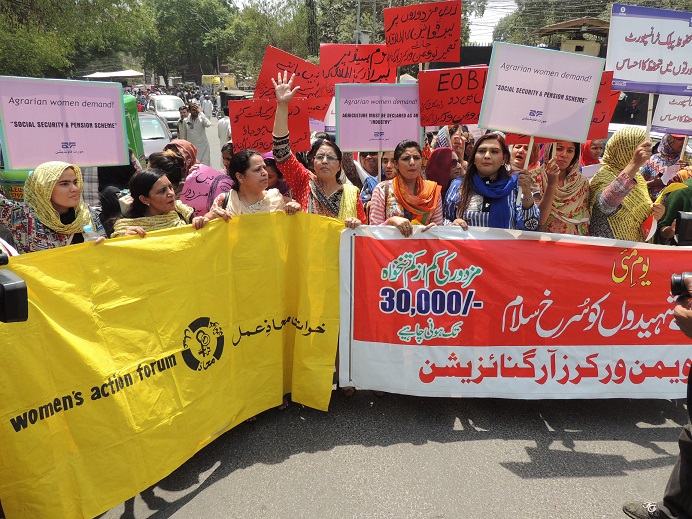
30-04-2018
Lahore
Agriculture sector must declare as an industry to protect the agrarian women labour rights because they as agrarian, WHBW and domestic labor force contributing 25 percent of our GDP ..
Women worker’s contribution in agriculture is still unrecognized and overlooked. Agriculture must declare as an “industry” and protect agrarian workers’ rights in labour laws. It is immense need to develop a road map for the promotion and protection of agrarian women workers’ rights in provincial legislative and policy framework of labour.
Chairperson, Women Rights Commission Mahnaz Rafi said that sex and gender-desegregated data is lacking, in general, and thus impacts negatively on women’s status. Ensure free and mandatory registration of all labour (women and men) in all the non-formal sectors of the economy, including, most importantly, the agricultural, HBWs and domestic labour force, which alone contributes over 25% of the GDP.
Mumtaz Mughal, Resident Director Auart Foundation urges to develop new definitions and standards of economic indicators in order to accord greater visibility of "invisible work force" and to complete the gaps and weaknesses in statistical records. Currently left out majority of women who work as unpaid agricultural labour (family helpers), domestic workers and home-based workers (HBWs) in the non-formal and non- unionized labour sector contribution in agriculture is unrecognized, unpaid, underrated, and overlooked. Acknowledging the Punjab government efforts towards women’s empowerment and gender equality, agriculture must declare as an “industry” and protect agrarian workers’ rights in labour laws. It is immense need to develop a road map for the promotion and protection of agrarian women workers’ right as labour rights in provincial legislative and policy framework of labour.
Ms. Shameela Aslam, MPA PML-N and business women said that there is need to create an environment that encourages rural women's increased participation in decision-making, on leadership, public-speaking, trade union, cooperatives and associations. Trade union leaders must create a trust worthy environment for agrarian women workers by providing them leadership opportunities and positions. Women representation must be mandatory in all price control, anjuman tajrans and other forums and committees.
Ms. Faiza Malik, MPA PPPP said that we are in era of technological revolution and agrarian women have often been excluded from agrarian reform and training programmes in new agricultural methods. It is essential to modernize and reconsider trade policies from a more feminist outlook.
Sadia Sohail, MPA PTI said that expedite legislation for the mandatory registration and identification of all women agricultural workers as a basic right. Provincial governments must introduce the social welfare state model to better safeguard and improve workers' rights and protection. There is need to make an effective monitoring and accountability mechanism on the implantation of labour laws.
Ms. Qasira Ismail, Member PCSW shared that rural women's access to credit is limited, complex procedures for securing credit; bias in lending institutions and fiscal regulations, lack of knowledge regarding credit programmes and opportunities including women’ s mobility also restrict women’s access to credit institutions.
Ms. Sara Sheraz, Manager Inspired+ Pakistan Programme highlighted the discriminatory barriers and sociocultural rigidities which remains the significant reasons hindering women from gaining effective control of property, assets and resources and restricting their mobility within workplace or employment and self-employment structures. She emphasized on establishment of effective engender grievance reporting and redressal mechanisms to address gender discrimination and harassment at workplace and public place.
Nabeela Shaheen Advocate said that working women's representation in the local power structures, such as at the ward, union council, town, district or provincial and national level, is limited. There is need to reserve peasant/workers seats in local bodies system at all level. She also said that government should take up legislative initiatives that promote equality in the wage system, more flexible working arrangements, increase the status of women in agriculture, home enterprises, and female-dominated professions in the informal sector.
Participants also demanded that the right of women agricultural workers to be registered as independent Women Heads of Households (WHHs) where indicated, especially women who are single, divorced, separated or widowed; institute special measures and affirmative action for them. Ensure legislation to safeguard the right of all agricultural workers, women and men, to a fair, just, decent, minimum wage. Encourage women farmers to form trade unions, associations and cooperatives. Government should establish pension and social security schemes for rural women their contributions from both "productive" and "reproductive" work. They also stressed upon strengthen and strictly adhere to the law banning Bonded Labour in urban, e.g. street beggars, brick kiln workers; in rural, e.g. agricultural workers/peasants/haaris/mazaaras, etc; and common everywhere: generational forced domestic labour.
|

